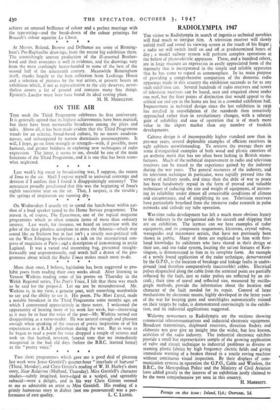ON THE AIR THIS week the Third Programme celebrates its
first anniversary. It is generally agreed that its highest achievements have been musical, but there have been memorable broadcasts among the plays and talks. Above all, it has been made evident that the Third Programme stands for an eclectic, broad-based culture, by no means unadven- turous, and unhampered by narrow doctrinaire preconceptions. It will, I hope, go on from strength to strength—with, if possible, more humour, and greater boldness in exploring new techniques of radio expression. The latter, it seems to me, should be one of the main functions of the Third Programme, and it is one that has been some- what neglected. * * * * Last week's big event in broadcasting was, I suppose, the return of lima to the air. Shall I expose myself to universal contempt and derision if I confess that I found it disappointingly unfunny? The announcer proudly proclaimed that this was the beginning of Itma's eighth successive year on the air. That, I suspect, is the trouble ; the springs of inspiration are running dry.
* * *
On Wednesdays I usually try to spend the lunch-hour within ear- shot of a loud speaker tuned to the Home Service programme. The reason is, of course, The Eyewitness, one of the topical magazine programmes which so often contain items of more than ordinary interest. Last week, for instance, we heard an interview with the pilot of the first pilotless aeroplane to cross the Atlantic—which may sound like an Irishism but in fact isn't; strictly non-political talk on the West Islington by-election ; a tak on the international con- gress of magicians at Paris ; and a description of iron-mining in arctic Lapland. It was a varied and interesting bag, presented straight- forwardly and unpretentiously, and worth half a dozen of the pro- grammes about which the Radio Times makes much more to-do. * * * * More than once, I believe, legislation has been suggested to pro- hibit poets from reading their own works aloud. After listening to Vernon Watkins reading some of his poems on Thursday in the Welsh Regional series, The Poet's Voice, I felt that there was much to be said for the proposal. Let me not be misunderstood. Mr. Watkins is, in my view, a genuine poet, with something worthwhile to say and the ability to say it. His poem, The Mari Lwyd, made a notable broadcast in the Third Programme some months ago, on which I commented appreciatively in these notes. I welcomed the opportunity of hearing more of his work last week, but—interesting as it may be to hear the voice of the poet—Mr. Watkins turned out disappointing as a verse-reader. He was natural enough and pleasant enough when speaking of the sources of poetic inspiration or of his experiences as a R.A.F. policeman during the war. But as soon as he began to read a poem his voice dropped a couple of octaves and took on that hushed, reverent, funeral tone that we immediately recognised in the bad old days (before the B.B.C. learned better) as the " poetry voice."
* * *
Two short programmes which gave me a good deal of pleasure last week were Joyce Grenfell's quarter-hour "interlude of humour" (Third, Monday), and Chris Gittins's reading of W. H. Harley's short story, Near Relations (Midland, Thursday). Miss Grenfell's character studies—subtly imagined, keen-edged as a scalpel, and agreeably subacid—were a delight, and in his way Chris Gittins seemed to me as admirable an artist as Miss Grenfell. His reading of a grimly humorous story in dialect (not too pronounced) was a per-


































 Previous page
Previous page